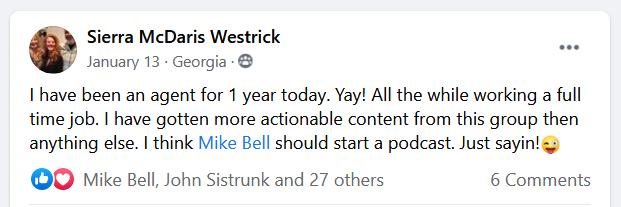
Why Witty Agents Get More Business
FACT: Your ability to attract clients has less to do with your “credentials”… and everything to do with how people feel about you. As a



The debate over whether it’s smarter to rent or buy a home is as old as the housing market itself. The truth is—it depends. The right choice varies by market conditions, location, timing, and your personal situation.
But while the short-term answer might shift, the long-term benefits of homeownership remain steady. Owning a home offers:
Even so, many renters feel like the system works against them. High rents make saving harder, other debts weigh heavily, and credit scores don’t always tell the full story. Until recently, even if you paid your rent on time every month, it didn’t even count toward your credit profile, leaving many renters with lower credit scores, or no credit history to speak of.
Fortunately, recent changes have made paying your rent on time something that can help you become a homeowner…
A recent Realtor.com article highlighted how reporting just $300 a month in rent can help put you on the path to qualifying for a mortgage.
Due to recent policy changes at Fannie Mae and Freddie Mac, which are government-sponsored companies that guarantee most of the mortgages in the U.S., mortgage lenders can now use credit ratings which take into account a renter’s payment history.
Of course, finding a place to rent for $300 today is easier said than done—but the point isn’t how much you pay. It’s how consistently you pay.
If you can document on-time payments—even for a modest room, studio, or space rented from a family member or friend—it may give your credit file a much-needed boost. The key is making sure it’s a legitimate lease with verifiable payments.
In other words, the habit matters more than the price tag.
According to Fannie Mae, paying rent of $300 or more for 12 consecutive months can in fact improve your eligibility for a home loan—but only if it gets reported.
While it’s great that lenders will consider your on-time rent payments, they need to see proof of it, and not all landlords report rental payments.
That’s a hurdle. Many small landlords and even some property management companies simply don’t submit tenant payment data.
It’s a missed opportunity, because reporting benefits landlords, too. It encourages on-time payments and can attract responsible tenants. So there are likely landlords in your area who are already reporting their tenants’ timely payments in order to attract great tenants and encourage them to pay on time each month.
And if yours does not currently report your payments, it may be as simple as asking them to, and pointing out how it is beneficial to them as well.
Still, since it isn’t universal, renters can’t always rely on their landlord to do it for them.
Fortunately, you don’t have to depend on your landlord to do it. You can take matters into your own hands…
A National Mortgage Professional article recently reported that while landlord reporting has slipped, self-reporting by renters is on the rise.
Data from TransUnion revealed that 44% of property managers reported rent payments in 2025, which was down from 48% the year before. While that was down, it’s still a huge improvement from 2022, when only 27% of them were doing so.
But overall, the data seems to be showing more renters are having their rents reported. In 2024 11% of renters had their rent payments reported, and this year it has jumped up to 13%, which is likely due to some renters self-reporting.
That shows movement in the right direction, but that still leaves a lot of renters who aren’t putting themselves in position to benefit from paying their rent on time.
If you’re serious about building your credit toward homeownership, and your landlord is not reporting your payments, consider rent-reporting services. This NerdWallet article outlined several important points:
These services can make your history of on-time payments work for you, just like a car loan or credit card would. So even though it might be a little work on your part and cost a few bucks, it’s a good investment of your time and money in order to start paving a path toward qualifying for a mortgage, and buying your own home.
The Takeaway:
Renting isn’t automatically “throwing money away”—especially now that timely payments can boost your credit. For many renters, this is the missing link between paying faithfully every month and finally qualifying for a mortgage.
The long-term benefits of owning a home are well-known: equity, stability, appreciation, and financial security. But the first step is often just proving you can handle consistent payments. By making rent count—whether through landlord reporting or self-reporting—you can start building the credit history that opens the door to homeownership.

(Shh, our secret)
Show your sphere your an expert. We have over 2100 articles covering every real estate topic your audience will love.
Position yourself as a real estate authority!
Real estate + topical events — the perfect match!
Become the bearer of good vibes!
Because hey, everyone loves to laugh!



Get our weekly email that makes communicating with your sphere on social actually enjoyable. Stay informed and entertained, for free.

FACT: Your ability to attract clients has less to do with your “credentials”… and everything to do with how people feel about you. As a

At this point everyone knows not to fall for the email from a Nigerian prince promising to share his fortune with you if you just

You’ve probably been told to build an email database and send them stuff consistently, right? Some agents do. Many don’t. Have you? If you haven’t,

1. Spamming your listings with no commentary Posting a link or sharing something on Facebook without your opinion is boring. Your friends want to know

There’s nothing better than working with a client who listens to every piece of advice you give along the way. It makes for a smooth
Depending on your situation, it may not take the full 30 minutes.

This reset password link has expired. Check the latest email sent to you.















